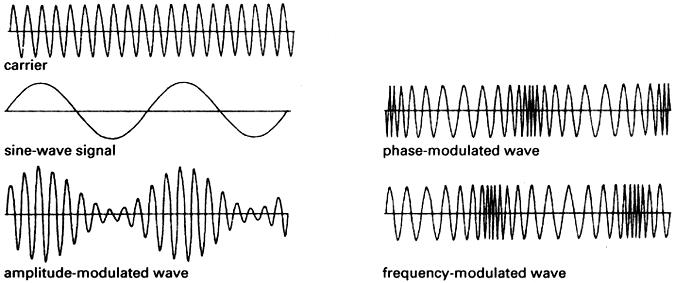The process of changing an electrical signal. In radio transmission, it is the process of superimposing the characteristics of a periodic signal onto a carrier wave so that the information contained in the signal can be transmitted by the wave. The simplest form of modulation is amplitude modulation (AM ), in which the amplitude of the carrier is increased or diminished as the signal amplitude increases and diminishes. The modulated wave is composed of the carrier wave plus upper and lower sidebands. In single-sideband modulation (SSB ) the carrier and one of the sidebands of an amplitude-modulated waveform are suppressed. This saves on bandwidth occupancy and signal power. In frequency modulation (FM ), the frequency of the carrier is increased or diminished as the signal amplitude increases and diminishes but the carrier amplitude remains constant. In phase modulation , the relative phase of the carrier is varied in accordance with the signal amplitude. (See illustrations.) Both frequency modulation and phase modulation are forms of angle modulation .
In pulse modulation the information is transmitted by controlling the amplitude, duration, position, or presence of a series of pulses. Morse code is a simple form of a pulse modulation.

Modulation
- quarter-wave plate
- quartile
- quartz
- quartz clock
- quasars
- quasicrystal
- quasiparticle
- quasiperiodicity
- quenching
- r.a.m.
- racemic mixture
- rad
- radar
- radial velocity
- radian
- radiance
- radiant energy
- radiant exitance
- radiant flux
- radiant intensity
- radiation
- radiation belts
- radiation damage
- radiation pressure
- radiation temperature